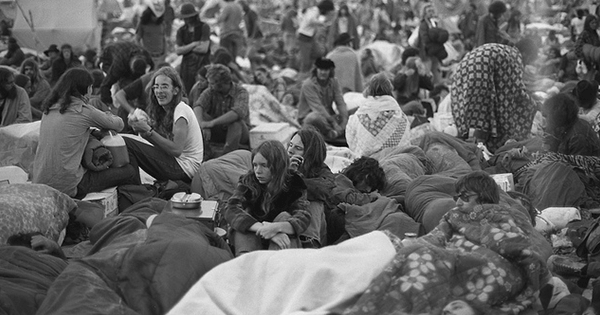
In 1968, when my quiet sister was 19 years old, she spent the summer cleaning pools and painting cottages in Woodstock, New York. She worked for a man named Morty. Their unspoken agreement was that she would work as hard as she could until early afternoon at which point she was released to walk and meditate. She loved to walk, and so she came to know not only the village of Woodstock but the adjacent woods and fields, meadows and pastures, dairies and cornfields, hills and dales, ponds and dingles. She climbed Mount Tobias and Mount Ohayo. She swam in Cooper Lake and Echo Lake. She knew old storytellers and farmers in the woods in the little clusters of houses the locals called Willow and Bearsville and Zena. For all Woodstock’s subsequent misplaced fame in regards to the festival, which was actually held in nearby Bethel, it is a small village and the countryside around it remains rural, the sort of rolling hills and forestlands where deer and foxes and owls outnumber farmers and wanderers.
One time my sister was wandering along the shore of the Ashokan Reservoir, under which lie the towns of Ashton, Brodhead, and Boiceville. A young man was standing on the weir that divides the lake into upper and lower basins and they got to talking. He did most of the talking, she says, more like mumbling really, but he was a most interesting guy and this is pretty much what he said.
[adblock-left-01]
Been on this wall many a time and many a time pondered jumping into the lake to see the towns down below and what might be there yet, but I believe there are fish down there bigger than you and me both so I have declined to commit to leaping, he said. Where I grew up a fish bigger than a person would eat a person given the hint of a chance and while I am assured that trout do not behave in this fashion I am not willing to wager my corporeal presence even in the damaged form it has assumed at present. But those towns down there do haunt me in ways that I am trying to set to music. One morning all the steam whistles in the valley blew continually for an hour to warn residents that the floods were imminent and once the whistles ceased to wail, the waters rushed in to obliterate alleys and attics, chapels and cellars, confessionals and milking stools, lawns and lanes, the nests of birds and the dens of foxes, the beds in which children had been conceived, porches on which old men smoked, places where the sunlight came late on account of the hunch of the hills. All now silence. Think of the music that could and should be written, the pastoral opening, the wail of the whistles, the roar of the waters, the long silence at the end. Someone should compose such a piece. And the spiders and the insects who crawl upon the earth, the snakes and squirrels, what happened to them, did they rise upon the waters and make their way exhausted to shore after dark and in latter times mold stories to tell their young in the span of years yet appointed to them, or did they too end their days in the blue musics of the deep?
Good questions, said my sister.
Got any beer? asked the young man.
I don’t, said my sister.
Pleasure to meet you, miles to go before I sleep, said the young man, hopping off the weir and limping away down the shore, and the way my sister tells the story is that a couple of years later when she was in a record store in Nebraska, this was after she was a puppeteer and before she was a circus clown, she noticed the young man’s face on a record, and realized that he was, or had been, Bob Dylan, although one of her convictions, which she holds all the more firmly now that she is a Buddhist nun in a monastery near Woodstock, is that who we were is not who we are, so she does not say that she met Bob Dylan, but rather says that once she met a most interesting young man on the shore of the Ashokan Reservoir, and that they got to talking about music that might be composed about that haunted spot, and that some years later a fiddler named Jay Ungar actually did compose a lament that his wife Molly Mason titled “Ashokan Farewell,” which Ungar and Mason play now every night in summer on the shore of the reservoir when they teach fiddle classes for kids, and if you have ever heard the song, says my sister, which you should, you will get the shivers down in the blue bones of your heart, which is a good thing to have happen, all things considered.

